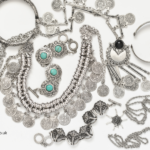Selling second-hand jewellery doesn’t have to be stressful or complicated. Whether it’s a piece that no longer suits your style, an inherited item you don’t wear, or an engagement ring from your past, there are several simple and profitable ways to sell second-hand jewellery in the UK.
This guide walks you through everything you need to know—from understanding jewellery valuation and identifying the best-selling platforms to tips on how to get the best possible return for your items.
Why Do People Sell Second-Hand Jewellery?
Fine jewellery made from gold, platinum, and diamonds rarely loses its value. In fact, many pieces appreciate over time due to material value or vintage appeal. People decide to sell their jewellery for many reasons, such as:
- Needing quick cash for personal or business use
- Decluttering or simplifying possessions
- Moving on from emotional or sentimental items
- Upgrading to a new design or modern style
Whatever your reason, knowing where and how to sell second-hand jewellery can make a big difference in the price you receive.
Jewellery Selling Tips: Know the True Value of Your Jewellery
Before approaching a buyer, take the time to understand what your jewellery is worth. Knowledge gives you confidence and helps prevent underselling your valuable pieces.
Here’s how to start:
- Get a professional appraisal: A qualified jeweller or certified valuer can assess the metal purity, gemstone quality, and craftsmanship.
- Understand resale vs retail value: Remember, buyers won’t pay retail prices. Offers are based on market demand, gold or diamond content, and the condition of your piece.
- Track gold and diamond prices: Stay updated on current market trends — selling when prices are strong can make a real difference.
This step is especially important if you’re selling vintage, antique, or diamond jewellery, as its value may exceed the weight of the materials alone.
Where to Sell Second-Hand Jewellery in the UK?
The UK has a variety of reliable options for selling pre-owned jewellery — each with unique advantages depending on your needs.
- High-Street Jewellers and Gold Buyers
Many high-street jewellers now buy gold and diamond jewellery for cash. This is convenient if you prefer quick, face-to-face transactions.
Pros:
- Instant payment
- No shipping or online listing required
Cons:
- Often offer less than true market value
- Limited expertise in vintage or branded jewellery
- Specialist Diamond Jewellery Buyers
If you’re selling diamond rings, bracelets, or necklaces, diamond specialists are your best bet. These professionals understand the true value of gemstones and often provide higher offers for quality stones.
Benefits:
- Accurate diamond grading (cut, clarity, colour, carat)
- Better value for certified diamonds (e.g., GIA or IGI)
- Knowledge of UK diamond resale markets
- Online Marketplaces and Auctions
Online platforms such as eBay, Etsy, or dedicated luxury resale websites have opened up the market for private sellers. You can connect directly with buyers across the UK and beyond.
Pros:
- Potential for higher prices, especially for rare or vintage designs
- Access to global buyers
Cons:
- Listing fees and commissions
- Requires effort to manage listings, negotiations, and shipping
- Risk of non-genuine buyers
- Reputable Online Jewellery Buyers
Selling through trusted online jewellery buyers is becoming the preferred option for many UK sellers. These companies offer secure, fully insured postal services and professional valuations — all from the comfort of your home.
Benefits:
- Free, no-obligation valuations and postage kits
- Professional gemmologist appraisal
- Fast payment via secure bank transfer
- No need to meet buyers in person
Always research company reviews and ensure the service is transparent and trustworthy before sending your jewellery.
- Pawnbrokers and Loan Shops
If you need immediate cash but may want your jewellery back later, pawnbrokers can provide short-term loans using your jewellery as collateral.
However, this isn’t ideal for valuable or sentimental pieces — if you’re unable to repay, you’ll lose ownership permanently.
How to Get the Best Price for Your Second-Hand Jewellery?
Maximise your jewellery’s resale value with these simple but effective strategies:
- Clean and polish your pieces before selling – presentation matters.
- Include certificates (such as GIA or hallmark papers) whenever possible.
- Don’t accept the first offer – compare valuations from at least two or three sources.
- Be realistic – most second-hand jewellery sells for 20–60% of its original retail price.
- Choose the right platform – high-end pieces deserve specialist buyers, while simpler gold jewellery may sell well at local shops.
These small steps can make a big difference in your final payout.
Selling Vintage and Antique Jewellery
Vintage and antique jewellery pieces can fetch exceptional prices if marketed correctly. Their value depends on age, design period, and craftsmanship quality.
Collectors often look for:
- Art Deco, Victorian, or Edwardian-era designs
- Limited-edition or rare models
- Original condition or minimal restoration
When selling antique jewellery online, choose platforms that attract serious collectors who understand its historic and artistic worth.
Final Thoughts
Selling Second-Hand Jewellery in the UK can be a smooth and rewarding process when done right. Whether you’re parting with a modern gold bracelet, a vintage brooch, or a diamond engagement ring, knowing your options and understanding your jewellery’s true value is key.
From local high-street jewellers to trusted online platforms, the right approach depends on your jewellery type, urgency, and desired price.
Armed with this knowledge — and a clear strategy — you can confidently navigate the UK jewellery resale market and achieve the best return for your treasured pieces.

